
Question Number 214409 by ajfour last updated on 07/Dec/24
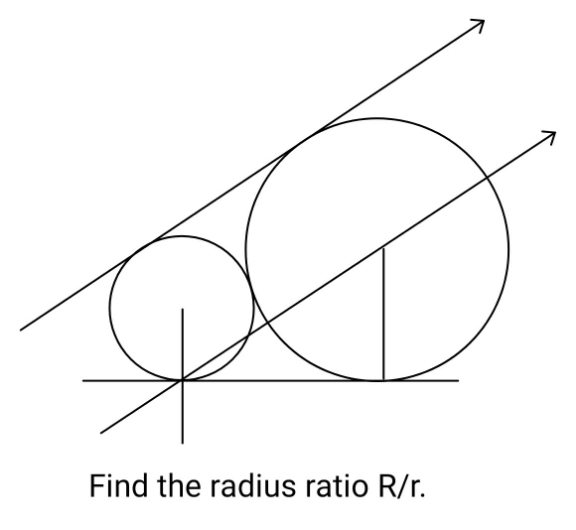
Answered by A5T last updated on 07/Dec/24
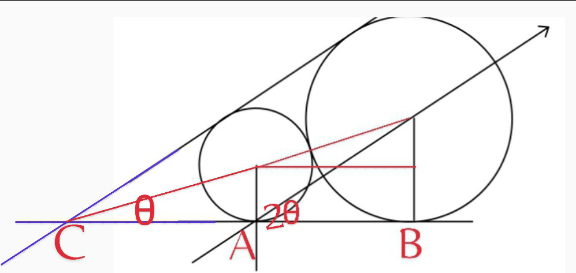
Commented by A5T last updated on 07/Dec/24
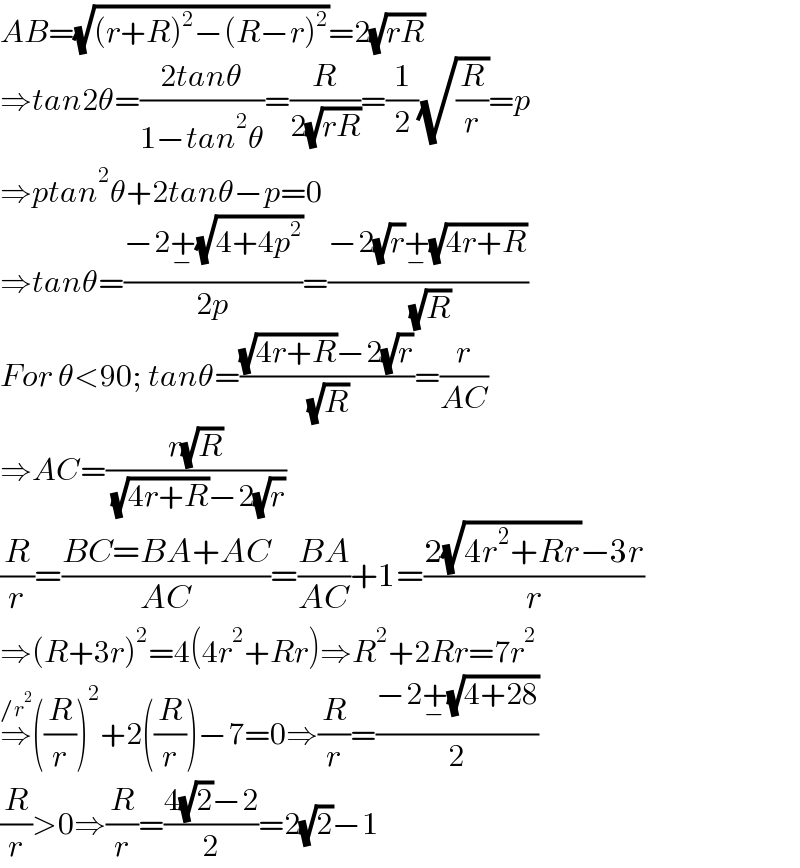
$${AB}=\sqrt{\left({r}+{R}\right)^{\mathrm{2}} −\left({R}−{r}\right)^{\mathrm{2}} }=\mathrm{2}\sqrt{{rR}} \\ $$$$\Rightarrow{tan}\mathrm{2}\theta=\frac{\mathrm{2}{tan}\theta}{\mathrm{1}−{tan}^{\mathrm{2}} \theta}=\frac{{R}}{\mathrm{2}\sqrt{{rR}}}=\frac{\mathrm{1}}{\mathrm{2}}\sqrt{\frac{{R}}{{r}}}={p} \\ $$$$\Rightarrow{ptan}^{\mathrm{2}} \theta+\mathrm{2}{tan}\theta−{p}=\mathrm{0} \\ $$$$\Rightarrow{tan}\theta=\frac{−\mathrm{2}\underset{−} {+}\sqrt{\mathrm{4}+\mathrm{4}{p}^{\mathrm{2}} }}{\mathrm{2}{p}}=\frac{−\mathrm{2}\sqrt{{r}}\underset{−} {+}\sqrt{\mathrm{4}{r}+{R}}}{\:\sqrt{{R}}} \\ $$$${For}\:\theta<\mathrm{90};\:{tan}\theta=\frac{\sqrt{\mathrm{4}{r}+{R}}−\mathrm{2}\sqrt{{r}}}{\:\sqrt{{R}}}=\frac{{r}}{{AC}} \\ $$$$\Rightarrow{AC}=\frac{{r}\sqrt{{R}}}{\:\sqrt{\mathrm{4}{r}+{R}}−\mathrm{2}\sqrt{{r}}} \\ $$$$\frac{{R}}{{r}}=\frac{{BC}={BA}+{AC}}{{AC}}=\frac{{BA}}{{AC}}+\mathrm{1}=\frac{\mathrm{2}\sqrt{\mathrm{4}{r}^{\mathrm{2}} +{Rr}}−\mathrm{3}{r}}{{r}} \\ $$$$\Rightarrow\left({R}+\mathrm{3}{r}\right)^{\mathrm{2}} =\mathrm{4}\left(\mathrm{4}{r}^{\mathrm{2}} +{Rr}\right)\Rightarrow{R}^{\mathrm{2}} +\mathrm{2}{Rr}=\mathrm{7}{r}^{\mathrm{2}} \\ $$$$\overset{/{r}^{\mathrm{2}} } {\Rightarrow}\left(\frac{{R}}{{r}}\right)^{\mathrm{2}} +\mathrm{2}\left(\frac{{R}}{{r}}\right)−\mathrm{7}=\mathrm{0}\Rightarrow\frac{{R}}{{r}}=\frac{−\mathrm{2}\underset{−} {+}\sqrt{\mathrm{4}+\mathrm{28}}}{\mathrm{2}} \\ $$$$\frac{{R}}{{r}}>\mathrm{0}\Rightarrow\frac{{R}}{{r}}=\frac{\mathrm{4}\sqrt{\mathrm{2}}−\mathrm{2}}{\mathrm{2}}=\mathrm{2}\sqrt{\mathrm{2}}−\mathrm{1} \\ $$
Commented by ajfour last updated on 07/Dec/24

$${wow}\:{super}\:{good}! \\ $$
Answered by mr W last updated on 07/Dec/24
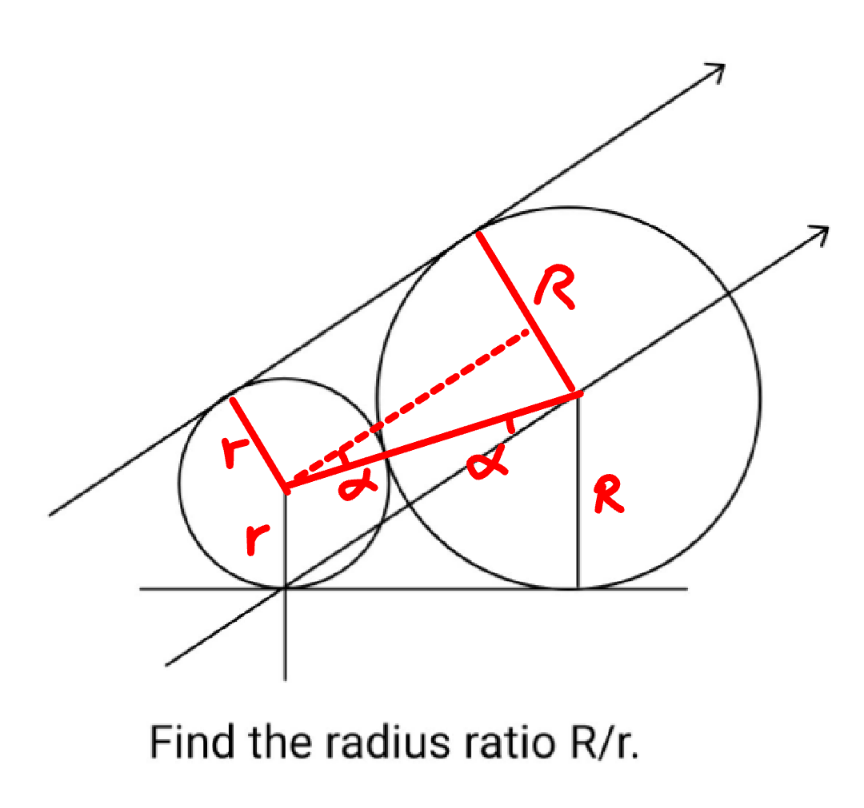
Commented by mr W last updated on 07/Dec/24
![let λ=(R/r) sin α=((R−r)/(R+r))=((λ−1)/(λ+1)) cos α=(((R+r)^2 +4Rr+R^2 −r^2 )/(2(R+r)(√(4Rr+R^2 )))) =((R^2 +3Rr)/((R+r)(√(4Rr+R^2 ))))=(((λ+3)λ)/((λ+1)(√(λ^2 +4λ)))) (((λ−1)/(λ+1)))^2 +[(((λ+3)λ)/((λ+1)(√(λ^2 +4λ))))]^2 =1 [(((λ+3)λ)/( (√(λ^2 +4λ))))]^2 =(λ+1)^2 −(λ−1)^2 =4λ λ^2 +2λ−7=0 ⇒λ=2(√2)−1 ✓](Q214418.png)
$${let}\:\lambda=\frac{{R}}{{r}} \\ $$$$\mathrm{sin}\:\alpha=\frac{{R}−{r}}{{R}+{r}}=\frac{\lambda−\mathrm{1}}{\lambda+\mathrm{1}} \\ $$$$\mathrm{cos}\:\alpha=\frac{\left({R}+{r}\right)^{\mathrm{2}} +\mathrm{4}{Rr}+{R}^{\mathrm{2}} −{r}^{\mathrm{2}} }{\mathrm{2}\left({R}+{r}\right)\sqrt{\mathrm{4}{Rr}+{R}^{\mathrm{2}} }} \\ $$$$\:\:\:\:\:\:\:\:\:\:=\frac{{R}^{\mathrm{2}} +\mathrm{3}{Rr}}{\left({R}+{r}\right)\sqrt{\mathrm{4}{Rr}+{R}^{\mathrm{2}} }}=\frac{\left(\lambda+\mathrm{3}\right)\lambda}{\left(\lambda+\mathrm{1}\right)\sqrt{\lambda^{\mathrm{2}} +\mathrm{4}\lambda}} \\ $$$$\left(\frac{\lambda−\mathrm{1}}{\lambda+\mathrm{1}}\right)^{\mathrm{2}} +\left[\frac{\left(\lambda+\mathrm{3}\right)\lambda}{\left(\lambda+\mathrm{1}\right)\sqrt{\lambda^{\mathrm{2}} +\mathrm{4}\lambda}}\right]^{\mathrm{2}} =\mathrm{1} \\ $$$$\left[\frac{\left(\lambda+\mathrm{3}\right)\lambda}{\:\sqrt{\lambda^{\mathrm{2}} +\mathrm{4}\lambda}}\right]^{\mathrm{2}} =\left(\lambda+\mathrm{1}\right)^{\mathrm{2}} −\left(\lambda−\mathrm{1}\right)^{\mathrm{2}} =\mathrm{4}\lambda \\ $$$$\lambda^{\mathrm{2}} +\mathrm{2}\lambda−\mathrm{7}=\mathrm{0} \\ $$$$\Rightarrow\lambda=\mathrm{2}\sqrt{\mathrm{2}}−\mathrm{1}\:\checkmark \\ $$
Commented by ajfour last updated on 08/Dec/24

$${great}\:{way}!\:{Sir}. \\ $$
Commented by ajfour last updated on 08/Dec/24
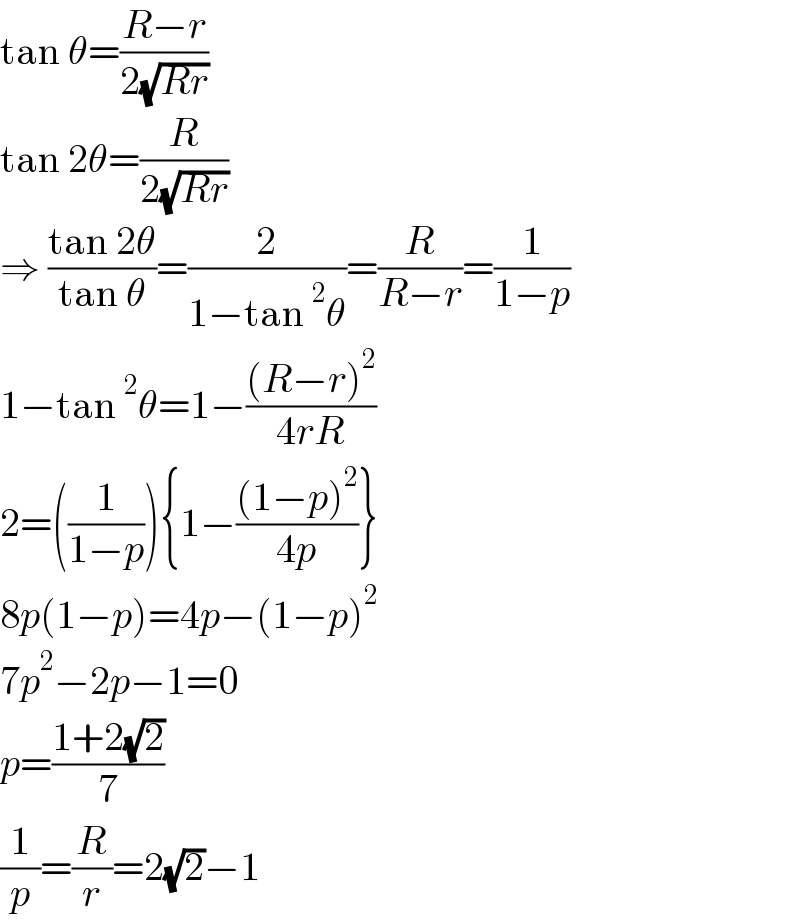
$$\mathrm{tan}\:\theta=\frac{{R}−{r}}{\mathrm{2}\sqrt{{Rr}}} \\ $$$$\mathrm{tan}\:\mathrm{2}\theta=\frac{{R}}{\mathrm{2}\sqrt{{Rr}}} \\ $$$$\Rightarrow\:\frac{\mathrm{tan}\:\mathrm{2}\theta}{\mathrm{tan}\:\theta}=\frac{\mathrm{2}}{\mathrm{1}−\mathrm{tan}\:^{\mathrm{2}} \theta}=\frac{{R}}{{R}−{r}}=\frac{\mathrm{1}}{\mathrm{1}−{p}} \\ $$$$\mathrm{1}−\mathrm{tan}\:^{\mathrm{2}} \theta=\mathrm{1}−\frac{\left({R}−{r}\right)^{\mathrm{2}} }{\mathrm{4}{rR}} \\ $$$$\mathrm{2}=\left(\frac{\mathrm{1}}{\mathrm{1}−{p}}\right)\left\{\mathrm{1}−\frac{\left(\mathrm{1}−{p}\right)^{\mathrm{2}} }{\mathrm{4}{p}}\right\} \\ $$$$\mathrm{8}{p}\left(\mathrm{1}−{p}\right)=\mathrm{4}{p}−\left(\mathrm{1}−{p}\right)^{\mathrm{2}} \\ $$$$\mathrm{7}{p}^{\mathrm{2}} −\mathrm{2}{p}−\mathrm{1}=\mathrm{0} \\ $$$${p}=\frac{\mathrm{1}+\mathrm{2}\sqrt{\mathrm{2}}}{\mathrm{7}} \\ $$$$\frac{\mathrm{1}}{{p}}=\frac{{R}}{{r}}=\mathrm{2}\sqrt{\mathrm{2}}−\mathrm{1} \\ $$
Answered by MathematicalUser2357 last updated on 12/Dec/24
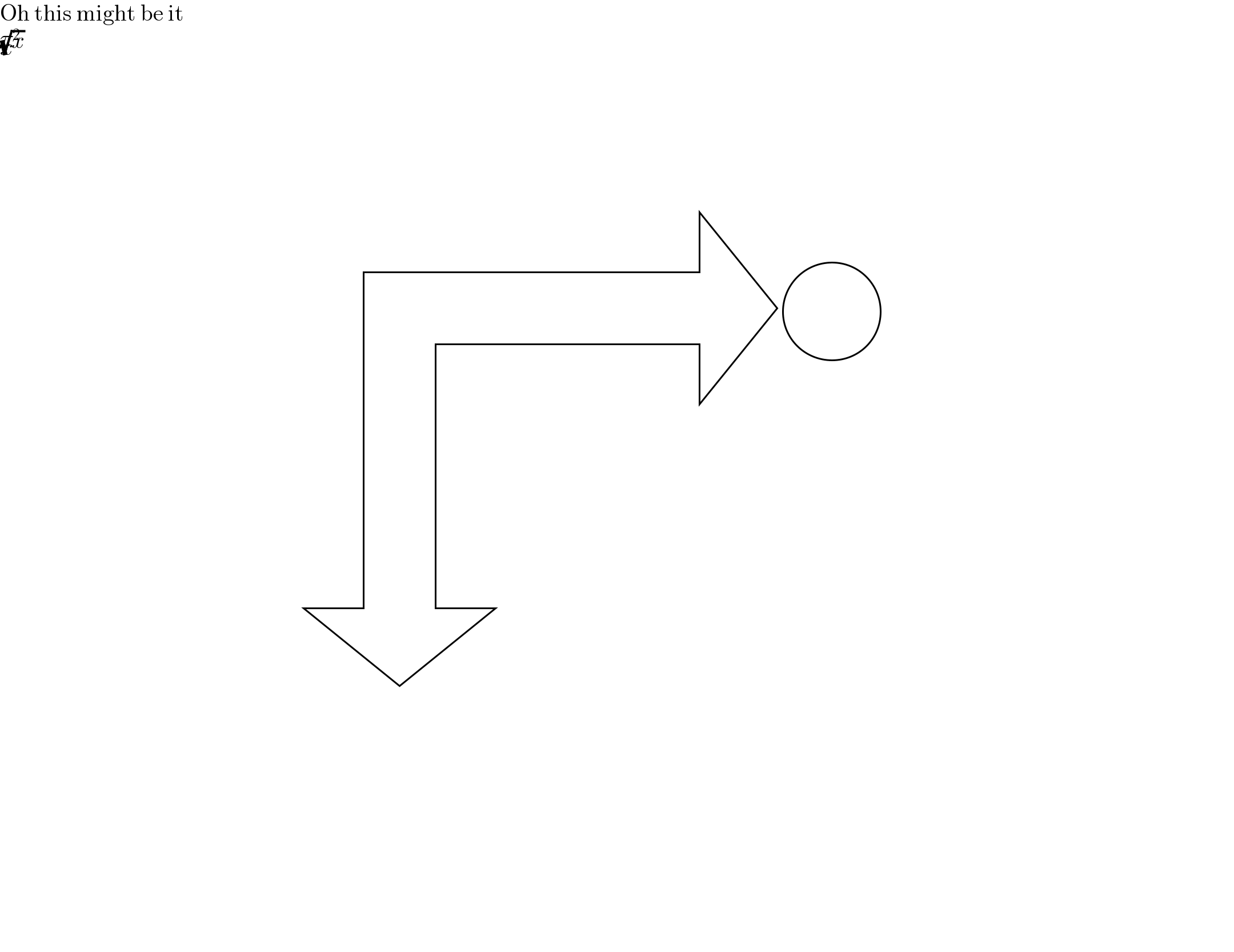
$$\mathrm{Oh}\:\mathrm{this}\:\mathrm{might}\:\mathrm{be}\:\mathrm{it} \\ $$$$ \\ $$
Commented by mr W last updated on 12/Dec/24

$${this}\:{app}\:{is}\:{powerful}\:{for}\:{writting} \\ $$$${formulae},\:{but}\:{weak}\:{for}\:{drawing} \\ $$$${diagrams}.\: \\ $$
